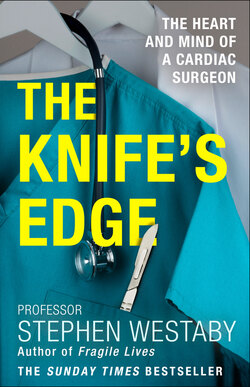Читать книгу The Knife’s Edge - Stephen Westaby - Страница 6
preface
ОглавлениеEvery single heart operation risks a life. This tension between kill or cure is unique to my specialty, with no professional equivalent, and few people can live with it on a daily basis. During my formative years, to operate within the heart was seen as the last surgical frontier. Direct vision repair was considered as difficult as landing on the moon or splitting the atom. Then the heart–lung machine and the swinging sixties changed everything. Heart transplants and artificial hearts both emerged during my impressionable medical school years. When I embarked on training in the 1970s, heart surgery remained an exclusive and remote club that was exceptionally difficult to join. Yet I was eventually granted the profound privilege of being able to improve thousands of lives.
Each heart is unique in its own way. Although most operations prove straightforward and uneventful, some evolve into an extraordinary battle for survival and a few are quite literally a bloody disaster. As my experience and knowledge increased, I became a last port of call for the cardiologically destitute, a depository for cases that no one else wanted, at home and abroad. Ultimately I lost patients whom I knew could be saved with equipment we were denied in the NHS. The recriminations that accompany death soon followed. An agonising interview with the bereaved, dismal discussions at the ‘Morbidity and Mortality Meeting,’ then a joyless visit to the coroner’s court. I was vehemently outspoken about the system’s deficiencies, and suffered as a result. The NHS doesn’t care for those who do not conform.
In this book I have set out to describe how it felt to be a heart surgeon as the specialty emerged and what it is like in the current hostile environment. I have depicted the physical and the psychological endeavour, the emotional highs and lows, the triumphs and the disappointments, and how being a surgeon affected me and my loved ones. When I was a young man, as we shall see, a peculiar quirk of fate helped me by dispelling my inhibitions and rendering me immune to fear. It’s not something I would freely recommend and it was a curious launchpad for a career at the sharp end, one that enabled me to embrace challenges that others would wish to avoid.
For someone who is not a professional writer, it takes an inordinate amount of time and effort to write a book for public consumption. You will undoubtedly conclude that I was more the surgeon than the literary genius, yet to my delight my first book, Fragile Lives, became an award-winning bestseller. As the title suggests, the book largely focused on remarkable cases. The Knife’s Edge is darker. It describes my humble beginnings, my struggle to succeed, and my priceless relationships with some of the pioneers and great leaders of the specialty. Because of the huge risks involved and the pile of bodies that ensued, the pioneers all manifested a particular personality type – bold, determined, often flamboyant, with resilience and immunity to grief. Sadly, so taxing is the lifestyle that by the end of my career few UK graduates were prepared to make it their calling and career. The ‘end of an era’, or the ‘end of the beginning’ as some would put it.
The whole riveting story of modern heart surgery evolved during my lifetime, and I was proud to be part of it.
